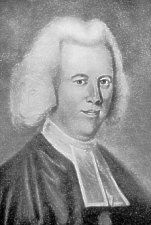
[taken from Chapter 1 Manx Worthies, A.W.Moore, 1901]
was the sixth son of Robert Moore, of Pulrose, and Catherine Kelly.[fpc not of Pulrose AWM confused] He went to the Grammar School in Douglas, which had been founded by Bishop Wilson in 1706, its master, on his entrance there, being the Rev. Peter Lancaster. He was succeeded in 1717 by the Rev Anthony Halsall, with whom PHILIP MOORE continued till 1726, when he went to Bishop's Court to be examined for "an academic scholar's place"1 by Bishop Wilson, who found him " fit." 2 In 1729, after some two years at the Academic School, Castletown, and a few months at Bishop's Court, where the Bishop prepared him for the ministry, he was ordained, and remained at Bishop's Court as chaplain till 1731, at a salary of £25. In 1731, he went to Marown as curate in charge, and, after being four years there he was appointed chaplain of St. Matthew's, and Master of the Douglas Grammar School. He took to his educational duties with zest, having " an inherent love of teaching."3 He was undoubtedly a good classical scholar, and " well read " generally. He was not ordained priest till 1739. The reason of this appears to have been that he refused to assent to the dogma that it was impossible that the heathen and the unbaptised could be saved. In 1751, he was appointed Rector of Ballaugh by the Duke of Atholl, whose chaplain he was, and he held this living with his other appointments, employing a curate to officiate there. In 1755, his beloved bishop, Wilson, whose chaplain he was, and to whom he was as devoted as to a father, died, and he preached his funeral sermon.4 With his successor, Bishop Hildesley, he was, as the numerous letters between them show, on terms of truly fraternal affection, but with the two bishops who followed he was altogether out of sympathy.
PHILIP MOORE will be chiefly remembered by the large share he had in the preparation of the Manx Bible. He translated part of the Psalms and Acts, and he revised the whole of the translations of the Old Testament made by the other clergy, as well as the second edition of the New Testament. But the work done by him which had the greatest influence upon his contemporaries was undoubtedly his teaching at the Grammar School in Douglas, and, as showing this, it may be mentioned that at his death all the clergymen but four at that time in the Manx Church had been educated by him. He was a remarkably good letter writer, his letters which have been preserved clearly indicating that he was possessed of a lively and somewhat sarcastic humour, combined with real kindliness of heart. It is, however, provoking not to find a single reference in them to any Manx custom, superstition, proverb or ballad, while they teem with eclessiastical quotations. He was buried in Kirk Braddan Churchyard, and there is a tablet to his memory at St. Matthew's.6 Butler, in his Memoirs of Bishop Hildesley, speaks of PHILIP MOORE as being " well known in the literary world," and as being " eminently distinguished as the divine, the gentleman, and the scholar.' 7 Referring to his conversation he remarks that " prompted by an uncommon quickness of parts, and refined by study, it was at once lively, instructive, and entertaining,"8 and, as to his correspondence, he says that it " breathed perhaps as much of original humour as can be met with in any writer who has appeared in public."
1 i.e., For an exhibition, of which there were
three or four. Bishop Wilson's Diary.
2 Letter from the writer's grandfather, who was one of his pupils in
his later years.
3 This sermon was published by Cruttwell in his Life of Bishop
Wilson,
6 Now
transferred to the new church
7 p. 186.
8 p. 188.

[see also Manx Note Book vol 1 p136 et seq] - his wiil of 1783 - some letters in Ramsey Church Magazine
|
|
||
|
Any comments, errors or omissions
gratefully received The
Editor |
||